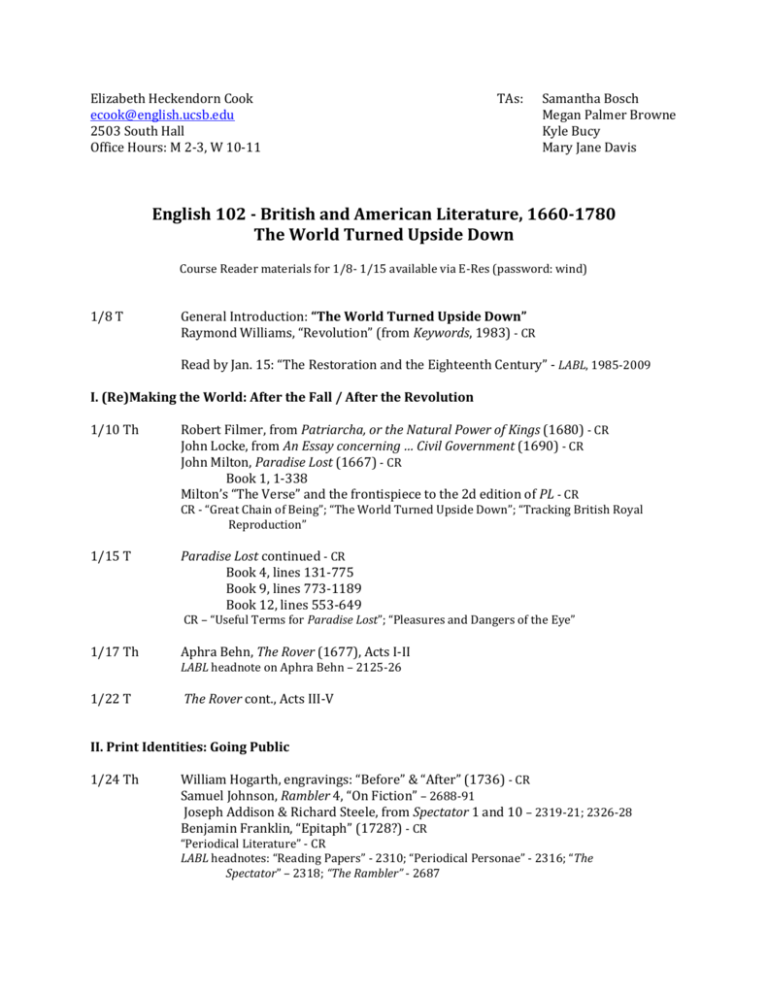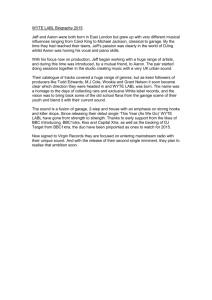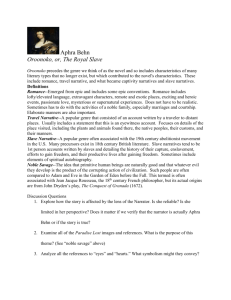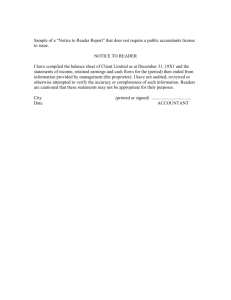Elizabeth Heckendorn Cook
advertisement

Elizabeth Heckendorn Cook ecook@english.ucsb.edu 2503 South Hall Office Hours: M 2-3, W 10-11 TAs: Samantha Bosch Megan Palmer Browne Kyle Bucy Mary Jane Davis English 102 - British and American Literature, 1660-1780 The World Turned Upside Down Course Reader materials for 1/8- 1/15 available via E-Res (password: wind) 1/8 T General Introduction: “The World Turned Upside Down” Raymond Williams, “Revolution” (from Keywords, 1983) - CR Read by Jan. 15: “The Restoration and the Eighteenth Century” - LABL, 1985-2009 I. (Re)Making the World: After the Fall / After the Revolution 1/10 Th Robert Filmer, from Patriarcha, or the Natural Power of Kings (1680) - CR John Locke, from An Essay concerning … Civil Government (1690) - CR John Milton, Paradise Lost (1667) - CR Book 1, 1-338 Milton’s “The Verse” and the frontispiece to the 2d edition of PL - CR CR - “Great Chain of Being”; “The World Turned Upside Down”; “Tracking British Royal Reproduction” 1/15 T Paradise Lost continued - CR Book 4, lines 131-775 Book 9, lines 773-1189 Book 12, lines 553-649 CR – “Useful Terms for Paradise Lost”; “Pleasures and Dangers of the Eye” 1/17 Th Aphra Behn, The Rover (1677), Acts I-II LABL headnote on Aphra Behn – 2125-26 1/22 T The Rover cont., Acts III-V II. Print Identities: Going Public 1/24 Th William Hogarth, engravings: “Before” & “After” (1736) - CR Samuel Johnson, Rambler 4, “On Fiction” – 2688-91 Joseph Addison & Richard Steele, from Spectator 1 and 10 – 2319-21; 2326-28 Benjamin Franklin, “Epitaph” (1728?) - CR “Periodical Literature” - CR LABL headnotes: “Reading Papers” - 2310; “Periodical Personae” - 2316; “The Spectator” – 2318; “The Rambler” - 2687 2 1/29 T Anne Bradstreet, “The Prologue [to her Book]” (1650); “The Author to her Book” (1666) - CR Anne Finch, “The Introduction” (wr. ?1680s-1710; pub. 1903) - 2187 Jonathan Swift, “Corinna” (1728) - CR CR - “Subjects in Print: texts and readers”; Bradstreet biography page 1/31 Th Alexander Pope, The Rape of the Lock (1717) Dedication letter “To Mrs. Arabella Fermor” – 2471-72 Cantos 1-2 – 2472-79 RL outline; “Useful Poetic Terms for Pope”; “‘Deep Structure’ of RL” - CR LABL headnotes on Pope – 2438-40 and “RL” - 2470 2/5 T Pope, Rape of the Lock cont., Cantos 3-5 - 2479-91 ***FIRST ESSAY due in class 2/7 Th Jonathan Swift, “The Lady’s Dressing Room” (1732) – 2346-49 “On a Beautiful Young Nymph Going to Bed” (1734) - CR Lady Mary Wortley Montagu, “The Reasons that Induced Dr. S. to write a Poem called ‘The Lady’s Dressing Room’” (1734) – 2350-52 LABL headnote to Swift – 2337-39 CR - “Questions for Swift’s ‘scatalogical poems’” 2/12 T MIDTERM (in class) III. Pastoral Upside Down: Golden Age or Age of Gold? 2/14 Th Ovid, “The Four Ages” (completed ?8 AD)- CR Swift, “A Description of the Morning” – 2340; “A Description of a City Shower” – 2341-42 and headnotes John Gay, The Beggar’s Opera (1728), Acts I-II.10 – 2557-82 CR - “Pastoral”; “Pastoral in (102) Context”; “The Golden Age / The Age of Gold” LABL headnotes to Gay - 2555-56 2/19 T The Beggar’s Opera, II.11 to end – 2582-2603 Swift, “A Modest Proposal” (1729) and headnote – 2430-37 IV. The Dark Side of Reason 2/21 Th Thomas Gray, “Ode on a Distant Prospect of Eton College” (1747) [2850]; “Elegy Written in a Country Churchyard” (1751) [2854] “The Ode / The Elegy”; “Paradigms for Poetry”; “The Sublime” - CR LABL headnote to Gray [2845] 2/26 T William Collins, “Ode to Fear” - CR; “Ode to Evening” – 2659-60 (both 1746) Horace Walpole, The Castle of Otranto (1764), Prefaces and Chapter 1 - 5-38 3 2/28 Th Otranto to end CR - “Romance v. Novel”; “Fathers & Lords in Otranto” V. New Worlds: Encounters and Declarations 3/5 T Behn, Oroonoko (1688) - 2137-78 CR - “Contact Zone”; “Mapping Oroonoko” LABL headnote – 2135-36 3/7 Th Oroonoko continued - lecture will focus on 2166-78 James Thomson, “Rule, Britannia” (1740) - 2655 3/12 T Alexander Pope, “Windsor-Forest” (1713) – 2459-70 3/14 Th Thomas Jefferson, headnote and “The Declaration of Independence” (1776) - CR Phillis Wheatley, “To the King’s Most Excellent Majesty. 1768”; “On Being Brought from Africa to America”; “To the Rt. Hon. William, Earl of Dartmouth …” (1773) – CR CR - “Windsor-Forest” outline LABL headnote- 2458 CR - Scipio Moorhead, frontispiece to Wheatley’s Poems on Various Subjects, Religious and Moral (1773) CR - “Revolutions in Print”; “Performatives” ***SECOND ESSAY due in class 3/18 M FINAL EXAM 12-3 – Girvetz 1004 REQUIRED TEXTS for the class: 102 Course Reader - at Grafikart, 6550 Pardall, I.V. LABL = Longman Anthology of British Literature: The Restoration and the Eighteenth Century [Vol. 1C], 4th edition. NY: Longman, 2010. Aphra Behn, The Rover (Regents Restoration Drama series). Univ. of Nebraska Press, 1967. Horace Walpole, The Castle of Otranto. Oxford World’s Classics, 1996. Use these editions if you can, since page numbers on Powerpoint slides and Course Reader handouts are keyed to them. Earlier editions of the LABL will also work well for this course (aside from pagination), and copies of these editions (but not the Course Reader) are on reserve at Davidson Library. For your formal essays, use these editions for citing quotations unless you have cleared the alternate edition with your TA in advance (this may be an issue for versions available on an ebook reader without pagination or assigned prefaces, for example). 4 Course Goals and Skills After taking this class, you’ll know more about - the historical and cultural contexts of literature written in English during the later seventeenth and eighteenth centuries in Great Britain and its North American colony - specific terms, approaches, and resources used in the study of literature The course will give you the chance to practice - slow reading (close / intensive engagement with texts) - critical analysis of texts (verbal and visual) - formulating an argument and gathering and organizing evidence to support it - active, informal (but informed and focused) discussions with peers - writing formal prose Course Requirements 1. Be there! Attendance at lectures will be important to your success in mastering the material. Section attendance is mandatory. Missing more than one section will affect your course grade. You will be dropped from the class if you fail to attend section. 2. Read the assigned material before the lecture, and bring it with you to lecture and section. Bring the text to lectures and sections, where we will actively practice together skills you will be tested on. Slow reading and note-making are crucial parts of gathering evidence for the kinds of essays you’ll be writing in this class. (See the handout “Some Thoughts about Close Reading” in the Course Reader.) Study questions are available on our GS site for most texts (some people prefer to read with specific issues and questions in mind). 3. Written work. At the back of the Course Reader you’ll find default information about paper formats, as well as models for citing poetry and prose. If your TA requests different formats, follow those. Please include the word-count for your essay, along with your name, TA’s name, and section day & time, in the heading of your formal essays. Proofread your essays -- don’t rely on your spell-check program! Uncorrected typos and spelling errors will affect a reader’s assessment of your credibility as a writer. As citizens of a virtual Republic of Letters, we all necessarily interact with other scholars and thinkers. Always acknowledge how the work of others has contributed to your thought processes and to your writing. If you have questions about how to do this, ask your TA or me. University regulations regarding academic dishonesty will be enforced. 4. No alternative exams or incompletes will be offered, except for triple-final-exam victims and documented medical emergencies. 5. Breakdown of final grade components: Section attendance, participation, and exercises = 20% First essay = 15% Midterm = 15% Second essay = 25% Final = 25% All components must be completed for you to receive a grade in the course.






